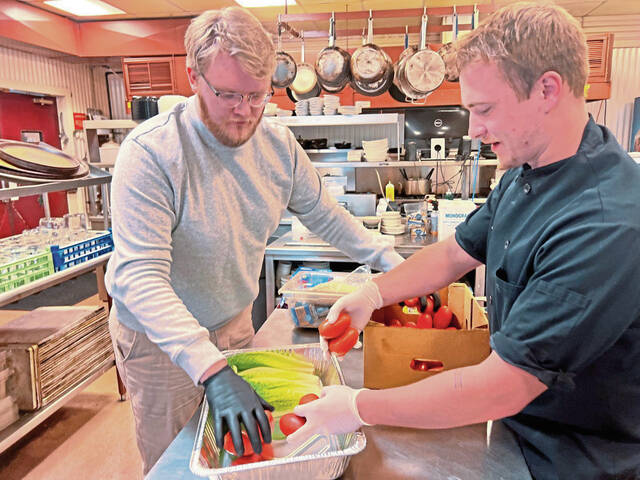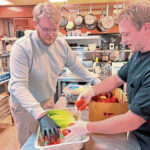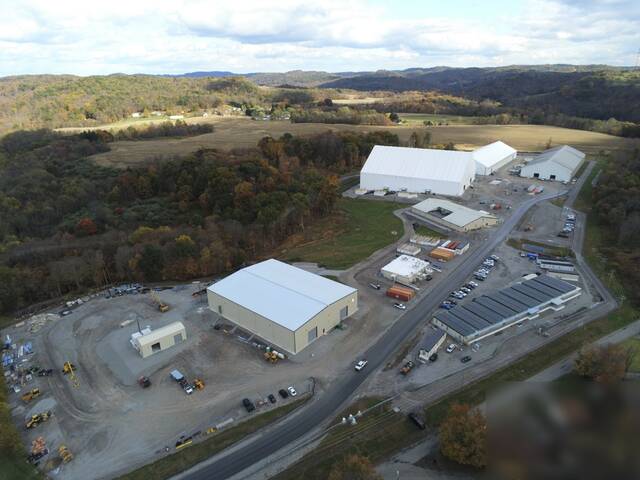When The Grill at River Forest caters a banquet, sometimes there are leftovers destined for the landfill.
But the River Forest Country Club’s restaurant in Allegheny Township has turned to donating the food to those in need. Since October, the restaurant has donated more than 300 pounds of prepared meals to the Allegheny Valley Association of Churches.
That’s “well over 100 meals” that otherwise would have been thrown away, said Karen Snair, the association’s executive director. The association uses the donated food to feed families through its housing support services and pantry — which is experiencing its highest demand in 10 years.
Americans threw away more than $444 billion worth of food in 2021, according to ReFED, a nonprofit dedicated to ending food waste. Consumer-facing businesses were responsible for 20% of this surplus, only 2% of which was donated.
With food insecurity on the rise and sustainability concerns mounting, “food rescuing” has emerged as a way to combat waste and hunger at the same time. It involves restaurants, grocery stores and wholesalers giving unused food to charitable organizations, which then pass it along to people in need.
It’s a simple model, but the real challenge is educating potential donors, said Brenda Russell, CEO of Fiorenza’s Food for Friends, a nonprofit that connects sources of food to organizations that feed the hungry.
“They don’t know that they legally can do it,” Russell said. “They think people don’t want some of this stuff.”
Donations legally protected
Organizations working with food-insecure families say the demand is there, and so are the legal protections.
The Good Samaritan Food Donation Act of 1996 protects people who make good faith donations of food products to nonprofits as well as the food banks that distribute them.
When Kyle Kubicko, event coordinator for River Forest Country Club, had an inkling that he wanted to start donating leftover food, he reached out to Fiorenza’s Food for Friends. From there, the nonprofit connected them with the Harrison-based Allegheny Valley Association of Churches and arranged for weekly pickups.
“It’s certainly an extremely easy process,” Kubicko said. “All it took was an email, and we got started just like that.”
Just a few years ago, the association of churches hardly ever received excess food from businesses, Snair said.
“When they started to see that they really could repurpose food and everything was fine, they loosened up,” Snair said.
Jen England of 412 Food Rescue agrees. As the organization’s head of partner development, she’s seen shifting attitudes about donating excess food.
“I think it’s become a much bigger part of the conversation in the country about sustainability and responsible food systems,” England said.
It’s not just small businesses.
Giant Eagle, Whole Foods, Pizza Hut and other chains work with 412 Food Rescue to transport food to nonprofits, England said. Once 412 Food Rescue volunteers pick up the food, they transfer it directly to distribution partners. While some of these partners are traditional food pantries, a majority are housing authorities, medical clinics and similar service providers.
England said donors benefit, too. For one, they throw away less food, reducing the amount of trash that needs to be hauled.
There also are tax incentives for businesses that donate unused food. The IRS allows qualified businesses to deduct the cost to produce donated food and half the difference between its cost and full fair market value. Pennsylvania businesses also can claim a credit equal to 55% of their contribution to a food rescue organization.
And, of course, there’s the value of helping out one’s neighbors for its own sake.
“I would not discount the philanthropic feeling,” England said. “It’s honestly the easiest way you can make a big difference in the world in any given day.”











